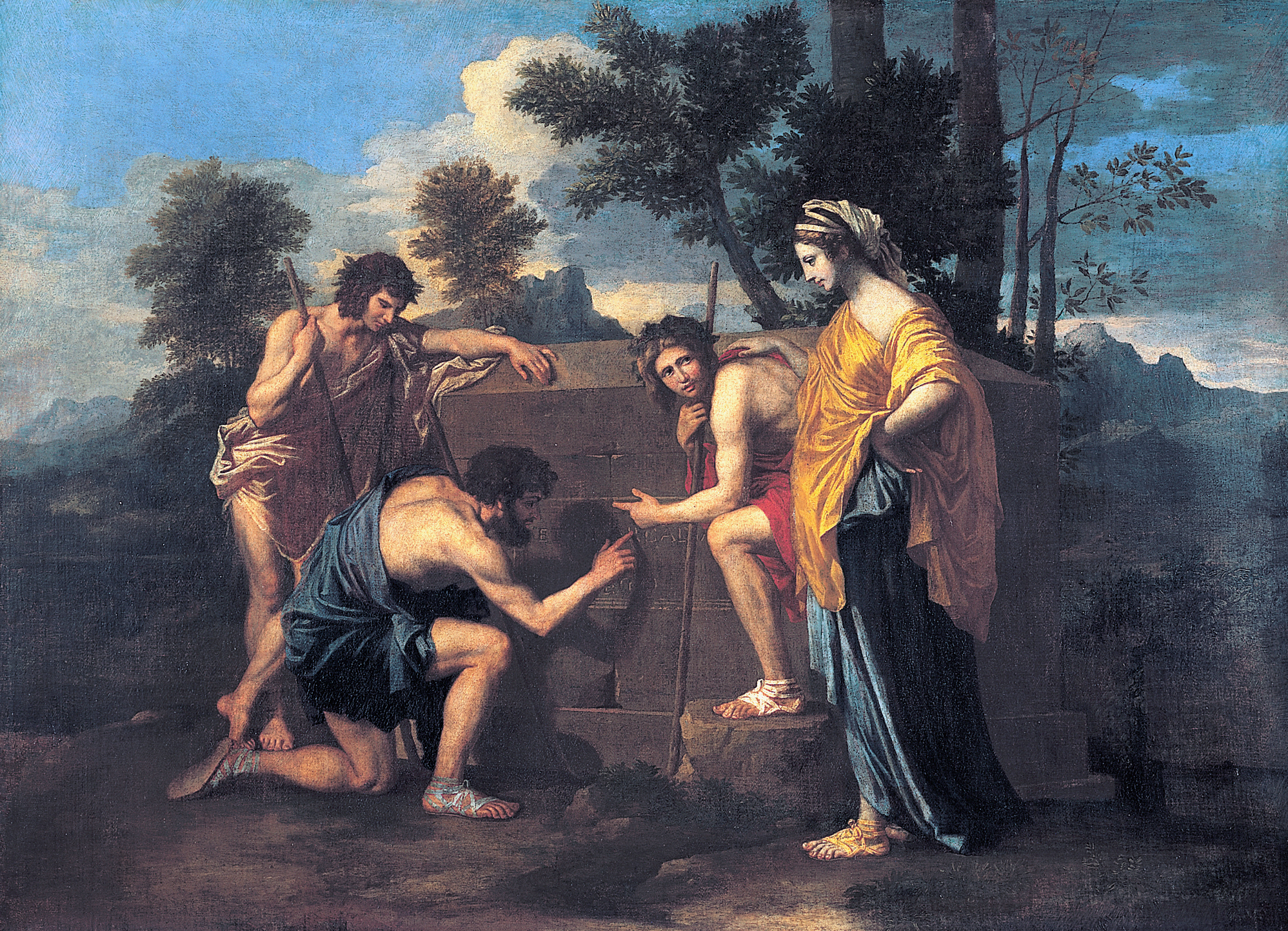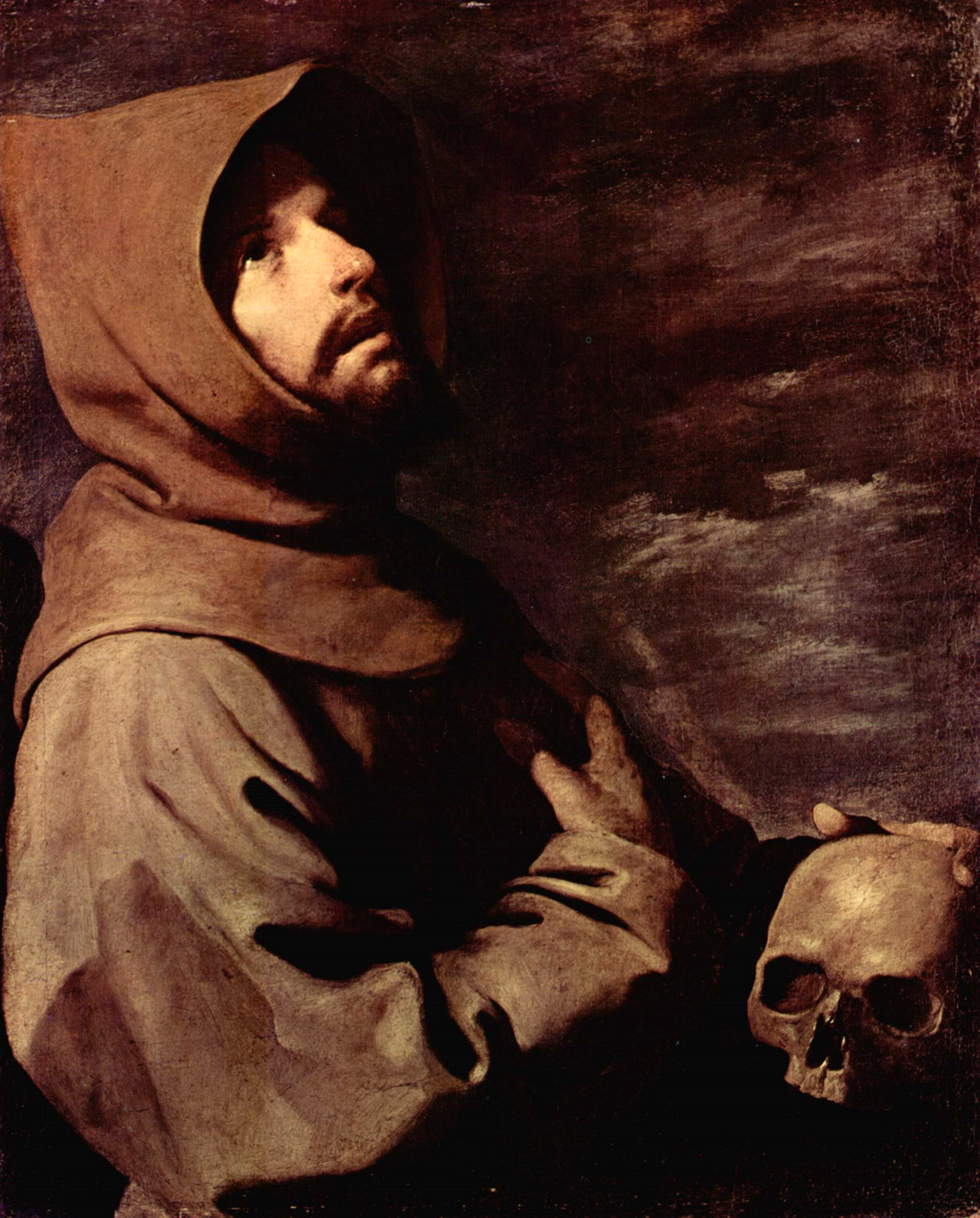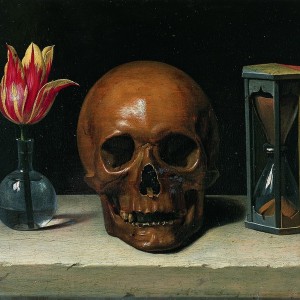Yesterday, as we went up for ashes, there’s a good chance that as he applied them to our foreheads, the priest said, “Remember, man, that you are dust, and to dust you shall return,” a reference to Genesis 3:19. A friend of mine asked how we, as Catholics, should understand this, in light of our belief in the resurrection of the body. I’d been thinking about the same thing yesterday. The short answer is that to believe in the resurrection of the body, you must first believe in death and decay. So let’s explore this seemingly-grim topic today.
 |
| Philippe de Champaigne, Vanitas (1671) (The images represent life, death, and time) |
You’re going to die.
We think of these words as threatening, or at least tasteless. But they’re undeniably true. Unless the Second Coming occurs during our lifetime (and more on that in a moment), the one thing we can count on happening in our life, with a theological certainty, is death. Hebrews 9:27 tells us that “man is destined to die once”: that is, while we can avoid Hell (the “second death”), we can’t avoid natural death.
There’s a natural human desire to want to avoid thinking about this. Particularly when we’re young, we think and act as if we’ll live forever. If we do have to acknowledge our mortality, it’s oddly comforting to imagine it in a grand Apocalypse, in which we don’t leave anything behind. Not only does this provide some meaning to our death, but it avoids painful separations in which others are left mourning for us. Rather, we all go on the great trip to the hereafter together. Of course, even this still involves dying. So if you prefer, there’s always the notion of a pre-tribulation Rapture, instead: “The rapture is an event that will take place sometime in the near future. Jesus will come in the air, catch up the Church from the earth, and then return to heaven with the Church.” This conveniently provides all the Heaven, with none of the suffering or death.
 |
| Nicolas Poussin, Et in Arcadia ego (1638) |
Catholicism avoids these easy opt-outs. We embrace the reality of death in an almost unsettling way. Look at the amount of Catholic art dedicated to memento mori (which literally means: “Remember you will die”). A popular Medieval Latin phrase was Et in Arcadia ego, meaning that death comes even to (utopian) Arcadia. No matter how wealthy or powerful you are, you can’t outrun, outsmart, or buy out death.
So why this focus on death? Precisely because death isn’t the end of the story. To believe in the resurrection of the dead, you have to first believe that the dead need resurrecting. That is, you have to implicitly acknowledge that our lifeless bodies will return to the dust, and that a supernatural intervention is necessary to restore and glorify us.
And just as death isn’t the last word for our bodies, it’s not the last word for our souls. As Hebrews 9:27-28 says,
Just as man is destined to die once, and after that to face judgment, so Christ was sacrificed once to take away the sins of many people; and he will appear a second time, not to bear sin, but to bring salvation to those who are waiting for him.
So yes, death is an inescapable part of the package. But death is our gateway to either eternal glory or damnation. We’re aware of death the way students pay attention to the clock during important tests. Once time’s up, it’s up.
This knowledge should keep us from sin. Sirach 7:40 says, “In all your works remember your last end, and you shall never sin.” Put another way, in the moment, sin can be incredibly tempting. But if you keep an eye constantly on eternity: on death, judgment, Heaven and Hell, the fleeting pleasures of sin lose their force. After all, no matter how enjoyable it might be for a moment, what sin could possibly warrant eternity in Hell? This is expressed well in a 1399 virelai written by Llibre Vermell de Montserrat:
 |
| Francisco de Zurbarán, Saint Francis (1658) |
Life is short, and shortly it will end;
Death comes quickly and respects no one,
Death destroys everything and takes pity on no one.
To death we are hastening, let us refrain from sinning.
If you do not turn back and become like a child,
And change your life for the better,
You will not be able to enter, blessed, the Kingdom of God.
To death we are hastening, let us refrain from sinning.
For Christians, death shouldn’t be something we’re scared of, but something we prepare ourselves for. We should strive to affirm with St. Paul (2 Cor. 5:8-9):
We are confident, I say, and would prefer to be away from the body and at home with the Lord. So we make it our goal to please him, whether we are at home in the body or away from it.
So the memento mori is helpful in reminding us of our need for a Savior, as well as the promise of eternal life. Just as Lent brings us to the glory of Easter, so too does death bring us to the joy of the Resurrection.

It also helps to understand that the poem “Ad Mortem Festinamus” (set to music by one of my favorite bands here:
http://www.youtube.com/watch?v=1my-mnW-x50 )
was written in the wake of the Black Death. Nothing like bringing someone to Jesus like seeing all of your family and friends die off in a few short days, leaving you totally alone.
I’m of the opinion that everyone, before their 25th birthday, should have to seriously face their own mortality.
They should be looking at the business-end of a fully-loaded gun, or should hear over the plane’s loudspeakers: “Please get into the crash position, ladies and gentlemen.” or hearing a doctor say: “You have six months to live” or realizing that your foxhole is about to be overrun by hajjis, and you only have one magazine left and the jets for the air strike you asked for are on the other side of this giant sandbox that tries to pass itself off as a country.
If one has never experienced that level of terror, there’s no way to explain it, once one has experienced that kind of fear and realization that: “Yes. You’re Gonna Die One Day!”, no explanation is needed.
I honestly think a lot of the BS that we do to one another in this life would come down, and people would be a lot more polite and kind to each other.
On a tangential note, I recently posted a discovery I found where the JW’s have a twisted view of the resurrection, namely interpreting the “resurrection of the unrighteous” as the resurrection of the ignorant rather than evil doers.
It all goes back to the Secularist problem of:
“If therefore no hope of a happy eternity remains when the body dies, what reason is there for men to undertake toil and suffering here in subjecting the appetites to right reason? The highest good of man will then lie in enjoying life’s pleasures and life’s luxuries. And since there is no one who is drawn to virtue by the impulse of his own nature, every man will naturally lay hands on all he can that he may live happily on the spoils of others.” (Leo XIII, Exeunte, 8)